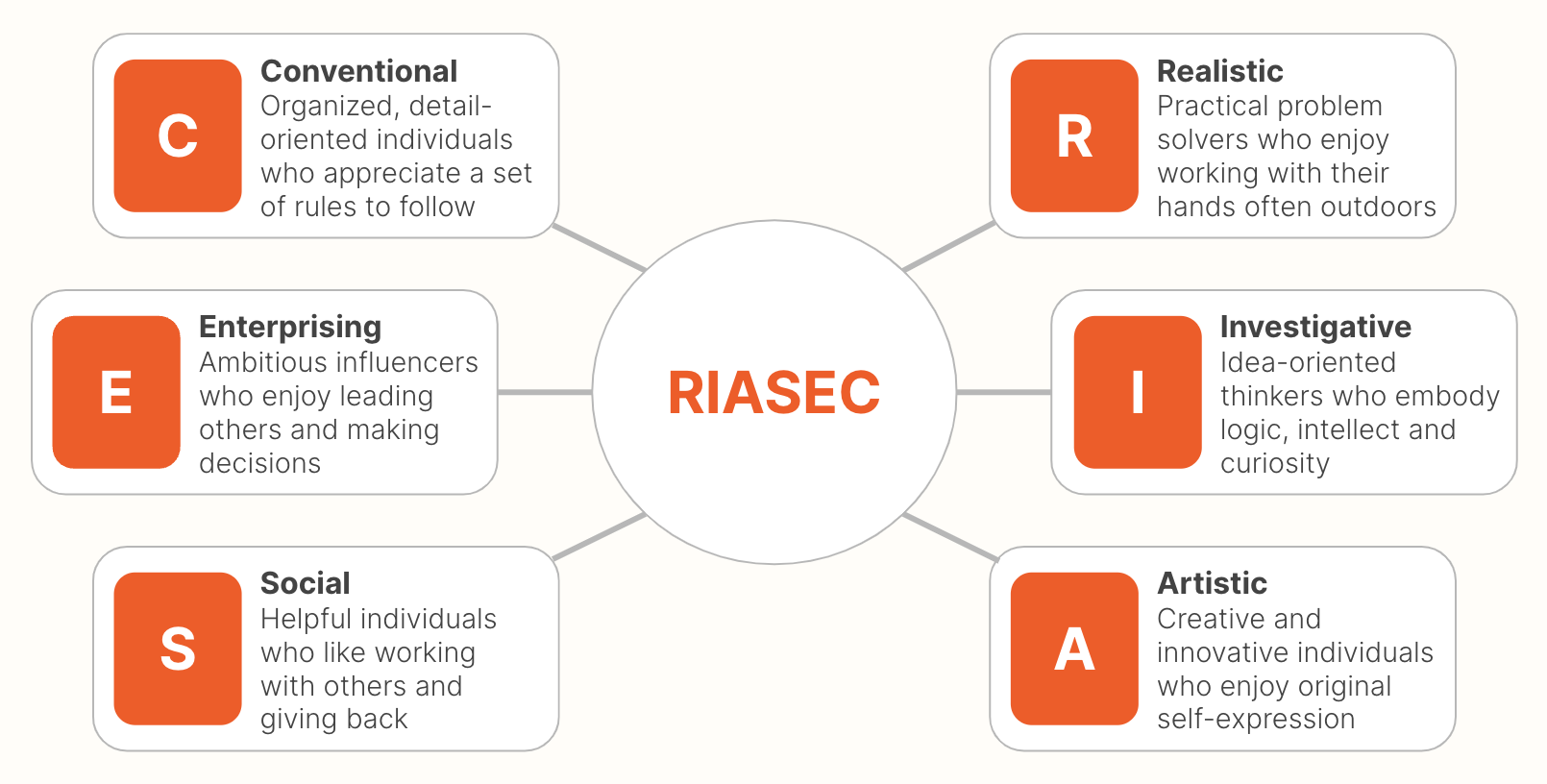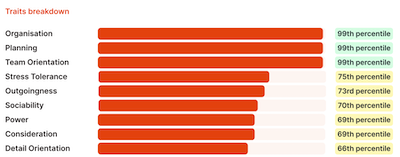Interest Inventory
The interest inventory identifies the work activities and environments in which candidates thrive.
Try for freeMore than 3000 Companies trust Neuroworx
What is a interest inventory?
Our interests draw our attention to specific activities or environments that we enjoy more than others. They are very often how we describe ourselves - in terms of likes and dislikes. In the context of work, our professional interests motivate us to learn more about certain topics or skills and enhance the joy derived from specific tasks.
Candidates naturally apply for roles they feel align with their interests. However, the hiring manager is most familiar with the role in question. Using an interest inventory in the hiring process means being able to check if a candidate’s interests are a good fit for the job.
Beyond hiring for required levels of skills and aptitude, understanding how likely a candidate is to enjoy the work adds a more sophisticated and often overlooked factor in determining the best candidate for a job.
By ensuring that a candidate’s interests align with the responsibilities in the role, you can set that individual up to be a satisfied, engaged, and productive employee.
About the Interest Inventory
Holland’s (1997) RIASEC model is the most popular and widely accepted theory in this area. Often thought of as personality types, these interest profiles provide unique information about individuals.
The model includes six core vocational interests: Realistic, Investigative, Artistic, Social, Enterprising, and Conventional.
Interest inventories or assessments are often used to help students or early career professionals identify what line of work would be the best fit and lead to optimum job satisfaction. This can be considered a candidate-focused test that when included in the hiring process, can lead to wonderful benefits for both the employee and the employer.
Why should you use a interest inventory for recruiting?
If you’re hiring a candidate who will spend a lot of their time sorting and organizing files, following procedures, and similar structured tasks, but end up selecting someone with a low score on the Conventional dimension, that candidate will likely become an unsatisfied, unproductive employee who might consider leaving before too long.
Using vocational interests as a hiring tool was initially met with some skepticism in the scientific community but has grown into a respected predictor of job success exhibiting a relationship with performance comparable to that of the most relevant personality traits (i.e. conscientiousness).
However, the key focus of prediction for this test is job satisfaction. Intuitively, if you enjoy the types of activities you have to do at work, you’ll like your job more. Job satisfaction is associated with lower levels of burnout among employees along with greater organizational commitment.
If employees are more interested in what they’re doing, they’re also more likely to pursue learning opportunities and produce better work through enhanced motivation. Assuming they have the required skills to perform their tasks, an employee’s interest in their work can drive exceptional performance.
Interest alignment also increases the likelihood that employees will stay in their jobs. Interests are a key aspect of determining job fit, specifically focused on how much an employee might enjoy their work tasks and environment.
View a sample report
Results for the Interest Inventory along with other assessments the candidate takes will be compiled to produce a candidate report.
The report is automatically generated and available both online and as a downloadable pdf so they can be shared with other team members and employees alike.

How our inventory assesses interests
Inspired by Holland’s RIASEC Model, Neuroworx developed an assessment to measure candidate preferences for tangible, concrete work activities. With six dimensions, this test summarises each candidate’s interest profile depicting their likes and dislikes.
Candidates respond to 30 statements to indicate how much they would enjoy specific work tasks. This brief test takes less than 5 minutes to complete and is not very demanding on candidates.
Results include how candidates score on each dimension as a percentile to illustrate how their interests compare to our talent pool. To maximize this test’s ability to predict candidate success, it is critical to interpret results by job-relatedness.
We advise hiring managers to avoid evaluating interests in terms of alignment with company culture. Instead, focus on the combination of activities required in the job being filled, and how those align with the candidate’s interest profile.
For example, a psychologist may benefit from being both Investigative and Social while also being less Realistic. Identifying the interests that a job does and does not support will optimize the use of this test in the hiring process.
This test was developed and reviewed by organizational psychologists and psychometric experts to ensure the results are meaningful and not disrupted by irrelevant bias or insensitivity.
Our test platform
Our platform offers an extensive library of hundreds of tests, giving you the flexibility to select and combine them in any way that suits your hiring needs. From understanding specific role requirements to assessing general cognitive abilities, our diverse library ensures you can tailor your assessment process precisely.
- Multi-format.
- Our test questions come in various formats, including multiple-choice, true and false, ranking and situational judgment, all ensuring comprehensive candidate assessment.
- Role-specific simulations.
- Experience real-world scenarios with our role-specific simulations, providing accurate insights into candidates' performance, readiness and fit for the position.
- Adaptive scoring.
- Our adaptive scoring system evaluates responses in real-time, by adjusting to the candidate's ability level, enhancing accuracy and reliability.
Curated by our
team of experts



Scientifically validated by psychometric specialists
- Our team of assessment experts is made up of I/O psychologists, psychometricians, and subject matter experts who work closely together to ensure each test is accurate and reliable.
- Our subject matter experts are rigorously vetted and typically have several years of experience working in their industries and hold advanced credentials.
Frequently asked questions
- What does an interest inventory measure?
An interest inventory test is a type of psychological test that measures an individual's interests.
This can be useful in determining what type of career or job would be a good fit for the individual. The results of the test can also help to identify areas where the individual may need further development.
- What other personality assessments should I consider?
When hiring candidates you might also want to consider some other personality assessments including our drives test which measures a candidate's motivations and our HEXACO Personality Test which understands a person's characteristics and work behaviors.
- What is the cost for Neuroworx’s interest inventory?
We believe in simple, transparent pricing. We operate monthly and annual subscriptions so you can pick the perfect plan for you. Don't worry if you're not sure: you can always upgrade or downgrade later, or speak to us to discuss the option of a custom made plan to fit your needs. This is all you ever pay – no set-up or hidden fees.
- Can I get a free trial?
Yes, sign up (no credit card required) and we'll give you a 7 day trial completely free. You'll get unlimited access to create as many jobs and test as many candidates as you like. You can cancel any time and you won't be charged anything.
Boost your hiring power.
Start using Neuroworx today.
Talk is cheap. We offer a 7-day free trial so you can see our platform for yourselves.
Try for free


